2021年主动句变被动句
主动句变被动句

主动句变被动句John helped Peter. ----- Peter was helped by John.转换规则1、主动句变被动句的实质是将主语和宾语的位置对调,动词由原来的形式变为be加上动词的过去分词。
如不需要突出动作的执行者,也可不要by-词组。
They punished the criminal. ----- The criminal was punished.2.如果主动句带有情态助动词或半助动词,在变为被动句时,情态动词或半助动词保持不变,谓语动词由主动变为被动。
They should do the work at once. ----- The work should be done at once.They must have finished their work. ----- Their work must have been finished.He is likely to let you down. ------ You are likely to be let down.3、如果主句是双宾语结构,变为被动句时刻有两种形式:一种是以间接宾语作主语;另一种是以直接宾语作主语。
They offered him some assistance.----- He was offered some assistance.----- Some assistance was offered to him.Father gave me a watch.----- I was given a watch.----- A watch was given to me.4、如果主句的结构带有宾语补足语,变被动的时候要将原来的宾语补语变为主语补语。
We have painted the windows white. ----- The windows have been painted white.They elected Tom monitor of the class. ---- Tom was elected monitor of the class.5、当主动句变为被动句时,有时用by-词组,有时不用。
主动语态变被动语态的几个特例

主动语态变被动语态的几个特例一、含有双宾语的句子变为被动语态时,多数将主动句中的间接宾语变为被动句的主语,直接宾语作保留宾语;也可将直接宾语变为主语,间接宾语作保留宾语,但这时保留宾语前多加介词to或for。
如:He gave me a new watch.→1) I was given a new watch.2) A new watch was given to me.二、含有复合宾语且宾语补足语是名词的句子变为被动语态时,只能将主动句中的宾语变为被动句中的主语,宾补不可变为主语。
如:They call me Jim.→I am called Jim.(不可说:Jim is called me.)三、主语为疑问词的疑问句变为被动语态时,用“By+疑问词(宾格)”置于句首。
如:Who broke the glass?→By whom was the glass broken?四、祈使句变为被动语态时,要改为“Let +原宾语+be+过去分词”。
如:Close the window.→Let the window be closed.五、带宾语从句的复合句变为被动语态时,多用it作形式主语置于句首,原宾语从句成为真正主语(从句),从句中也需用被动语态。
如:People said that Lin Feng could take good care of the baby.→It was said that the baby could be taken good care of by Lin Feng.六、含有谓语动词know的主动句变为被动语态时,不用by短语,需by改为to。
如:We all know the scientist.→The scientist is known to us all.七、no one、nobody等否定代词作主语的句子变为被动语态时,谓语动词用否定式,不再用原主语,但可加上byanyone、byanybody等短语。
被动语态讲解(1)主动句变为被动句所遵循的4个步骤:

被动语态讲解(1)主动句变为被动句所遵循的4个步骤:初中被动语态语法讲解主动句变为被动句所遵循的4个步骤:1、把原主动句中的宾语变为被动句的主语2、把动词变为被动形式即be +过去分词,并注意其人称和数随主语的变化,而动词的时态则保持不变。
3、原主动句的主语如需要则放在by后面以它的宾格形式出现(注代词的宾格),如不需要则可省略。
4、其它的成分(定语、状语)不变。
(一) 语态分类英语动词有两种语态.,主动语态和被动语态。
主动语态表示主语是动作的执行者,被动语态表示主语是动作的承受者。
如:They will build a new bridge over the river. (主动)A new bridge will be built over the river. (被动)汉语中常用“被”、“给”、“由”、“受”等词用来表示被动,而英语用:助动词be + 及物动词的过去分词构成。
(二) 被动语态的时态、人称和数的变化主要体现在be的变化上,其形式与系动词be的变化形式完全一样。
一般现在时:am / is / are + done一般过去时:was / were + done一般将来时:shall / will + be done一般过去将来时:should / would + be done现在进行时:am / is / are + being + done过去进行时:was / were + being + done现在完成时:have / has + been + done过去完成时:had + been + done将来完成时:shall / will + have been + done过去将来完成时:should / would + have been + done[注]被动语态没有将来进行时和过去将来进行时。
(三)常见的八种时态中的被动语态1. 一般现在时:(1)People grow rice in the south of the country.Rice is grown in the south of the country.(2)The school doesn't allow us to enter the chemistry lab without a teacher. We are not allowed to enter the chemistry lab without a teacher.2. 一般过去时:(1)They agreed on the building of a new car factory last month.The building of a new car factory was agreed on last month.(2)The students didn't forget his lessons easily.His lessons were not easily forgotten3. 一般将来时:(1)They will send cars abroad by sea.Cars will be sent abroad by sea.(2)They will give plenty of jobs to school-leavers.Plenty of jobs will be given to school-leavers.4. 过去将来时:(1)The manager said they would complete the project by the end of the year. The manager said the project would be completed by the end of the year. (2) The workers told me they would mend the car as soon as possible.The workers told me that the car would be mended as soon as possible.5. 现在进行时:(1)The radio is broadcasting English lessons.English lessons are being broadcasted on the radio.(2) We are painting the rooms.The rooms are being painted.6. 过去进行时:(1)The workers were mending the road.The road was being mended.(2)This time last year we were planting trees here.Trees were being planted here this time last year.7. 现在完成时:(1)Someone has told me the sports meeting might be put off.I have been told the sports meeting might be put off.(2)He has brought his book here.His book has been brought here.8. 过去完成时:(1)When I got to the theatre, I found they had already sold out the tickets.When I got to the theatre, I found the tickets had already been sold out.(2) The whole country was very sad at the news of his death; People had considered him to be a great leader.He had been considered to be a great leader(四)含有情态动词的被动语态:含有情态动词的被动语态是由“情态动词+ be+ 及物动词的过去分词”构成。
被动语态讲解(1) 主动句变为被动句所遵循的4个步骤:

初中被动语态语法讲解主动句变为被动句所遵循的4个步骤:1、把原主动句中的宾语变为被动句的主语2、把动词变为被动形式即be +过去分词,并注意其人称和数随主语的变化,而动词的时态则保持不变。
3、原主动句的主语如需要则放在by后面以它的宾格形式出现(注代词的宾格),如不需要则可省略。
4、其它的成分(定语、状语)不变。
(一) 语态分类英语动词有两种语态.,主动语态和被动语态。
主动语态表示主语是动作的执行者,被动语态表示主语是动作的承受者。
如:They will build a new bridge over the river. (主动)A new bridge will be built over the river. (被动)汉语中常用“被”、“给”、“由”、“受”等词用来表示被动,而英语用:助动词be + 及物动词的过去分词构成。
(二) 被动语态的时态、人称和数的变化主要体现在be的变化上,其形式与系动词be的变化形式完全一样。
一般现在时:am / is / are + done一般过去时:was / were + done一般将来时:shall / will + be done一般过去将来时:should / would + be done现在进行时:am / is / are + being + done过去进行时:was / were + being + done现在完成时:have / has + been + done过去完成时:had + been + done将来完成时:shall / will + have been + done过去将来完成时:should / would + have been + done[注]被动语态没有将来进行时和过去将来进行时。
(三)常见的八种时态中的被动语态1. 一般现在时:(1)People grow rice in the south of the country.Rice is grown in the south of the country.(2)The school doesn't allow us to enter the chemistry lab without a teacher. We are not allowed to enter the chemistry lab without a teacher.2. 一般过去时:(1)They agreed on the building of a new car factory last month.The building of a new car factory was agreed on last month.(2)The students didn't forget his lessons easily.His lessons were not easily forgotten3. 一般将来时:(1)They will send cars abroad by sea.Cars will be sent abroad by sea.(2)They will give plenty of jobs to school-leavers.Plenty of jobs will be given to school-leavers.4. 过去将来时:(1)The manager said they would complete the project by the end of the year. The manager said the project would be completed by the end of the year. (2) The workers told me they would mend the car as soon as possible.The workers told me that the car would be mended as soon as possible.5. 现在进行时:(1)The radio is broadcasting English lessons.English lessons are being broadcasted on the radio.(2) We are painting the rooms.The rooms are being painted.6. 过去进行时:(1)The workers were mending the road.The road was being mended.(2)This time last year we were planting trees here.Trees were being planted here this time last year.7. 现在完成时:(1)Someone has told me the sports meeting might be put off.I have been told the sports meeting might be put off.(2)He has brought his book here.His book has been brought here.8. 过去完成时:(1)When I got to the theatre, I found they had already sold out the tickets.When I got to the theatre, I found the tickets had already been sold out.(2) The whole country was very sad at the news of his death; People had considered him to be a great leader.He had been considered to be a great leader(四)含有情态动词的被动语态:含有情态动词的被动语态是由“情态动词+ be+ 及物动词的过去分词”构成。
句子大全之英语句子主动变被动语态多种情况例析

英语句子主动变被动语态的多种状况例析中国人思想的着眼点在动作的施动者,英佳人思想的着眼点在动作的蒙受者。
中国人常这样说:i expect you to be there on time. 我希望你准时到那边。
英佳人常这样说:you are expected to be thereon time. 希望你准时到那边。
这就是英语中被动语态的使用比汉语中多的原由。
因为英语句子的主动语态构造不一样,因此变为被动语态的方式也各不同样,总结起来主要有几方面。
一、主语+谓语+宾语“主语+谓语+宾语〞构造中只有一个宾语,变为被动语态时,将宾语变为主语。
如:they will discuss the plan at the meeting. 他们将在会议上议论这个问题。
——the plan will be discussed at the meeting. 这个问题将在会议上议论。
二、主语+谓语+间接宾语+直接宾语在这个句型中,谓语动词后有两个宾语。
变为被动语态时,一般将往常指人的间接宾语转变为主语,但有时也可将指物的间接宾语转变成主语。
如:we gave the student some books. 我们给了这个学生几本书。
——the student was given some books. 这个学生被给了几本书。
注意:用直接宾语作被动语态的主语时,往常要在间接宾语前加上合适的介词(如to,for,of 等),以增强间接宾语的语气。
the host had caught us some fish. 主人给我们捉了一些鱼。
——some fish had been caught for us by the host. 主人给我们捉了一些鱼。
(for 不行省)三、主语+谓语+宾语+宾语补足语在这个句型中,谓语动词后有一个宾语和一个宾语补足语,变为被动语态时,宾语转变为主语,宾语补足语也随之变为主语补足语。
如:all the villagers painted the houses white. 全部村民都把房屋涂成了白色。
主动句与被动句的互换
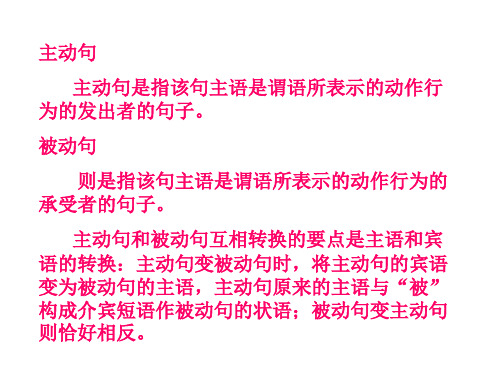
“被”字句有如下类型: 被 字句有如下类型: 引进施事,格式是:受事+被十施事 被十施事+动词性词 (1)由“被”引进施事,格式是:受事 被十施事 动词性词 ) 教室被我们打扫干净了。许云峰被特务盯上了。 语。如:教室被我们打扫干净了。许云峰被特务盯上了。 后边施事没有出现,格式是:受事+被 动词性词 (2)“被”后边施事没有出现,格式是:受事 被+动词性词 ) 由于“ 后边没有宾语,此处的“ 字是助词。 语。由于“被”后边没有宾语,此处的“被”字是助词。如: 大楼被炸倒了。课被推迟了。车子被骑走了。 大楼被炸倒了。课被推迟了。车子被骑走了。 (3“被……所”固定格式:受事 被+施事 所+动词性词语。这 施事+所 动词性词语 动词性词语。 被 所 固定格式:受事+被 施事 种格式一般只在书面语中使用,是从“ 种格式一般只在书面语中使用,是从“为……所”演变而来的, 所 演变而来的, 也可以使用“ 也可以使用“为……所”式或“由……所”式和“受……所” 所 式或“ 所 式和“ 所 后面的动词多为双音节。 我们不能被表面现象所迷惑。 式。后面的动词多为双音节。如:我们不能被表面现象所迷惑。 同学们深深地被老人的话所感动,决心好好学习。 同学们深深地被老人的话所感动,决心好好学习。 她为生活所 背井离乡三十年。 新的软件系统为广大用户所关注。 迫,背井离乡三十年。 新的软件系统为广大用户所关注。 文 学家在阶级社会必受自己的本阶级的阶级意识所支配。 学家在阶级社会必受自己的本阶级的阶级意识所支配。 局势的 发展是由各种因素所决定的。
进入“ 进入“被”字句的动词比“把”字句宽泛些,像部 字句的动词比“ 字句宽泛些, 分心理动词、认知动词等也可以进入“ 分心理动词、认知动词等也可以进入“被”字句的 谓语部分。 他的意图竟被我们感觉到了。 谓语部分。如: 他的意图竟被我们感觉到了。 他的行踪被特务知道了。 他的行踪被特务知道了。 但也不是所有的心理认知动词都能进入“ 但也不是所有的心理认知动词都能进入“被”字句 充当述语, 希望” 害怕” 充当述语,如“怕”、“希望”、“害怕”、“主 觉得”等就不能进入。 张”、“觉得”等就不能进入。
句型转换的规则

句型转换的规则句型转换是英语语法中的一个重要内容,它指的是通过改变句子结构或使用不同的句型表达相同的意思。
在句型转换中,我们需要遵循一些规则和原则,以确保句子的意思准确传达,同时让句子更富有变化和表现力。
一、主动和被动句的转换主动句是以主语作为动作的执行者的句子,而被动句则是强调动作的接收者。
在主动句和被动句之间转换时,我们需要注意以下几点规则:1. 将主动句转换为被动句时,将动作的执行者变为句子的主语,原主语变为动作的接收者;2. 将被动句转换为主动句时,将动作的接收者变为句子的主语,原主语变为动作的执行者。
例子:主动句:The boy kicked the ball.被动句:The ball was kicked by the boy.被动句:The book was written by the author.主动句:The author wrote the book.二、陈述句、疑问句和祈使句的转换陈述句是用于陈述事实或观点的句子,疑问句用于提问,祈使句用于表示请求或命令。
在这三种句型之间的转换中,我们需要注意以下规则:1. 陈述句转疑问句时,将句首的动词提到主语之前,并在句末加上问号;2. 疑问句转陈述句时,将句首的助动词或情态动词放到句末,并去掉问号;3. 祈使句转陈述句时,改变动词形式,通常使用动词原形。
例子:陈述句:She is reading a book.疑问句:Is she reading a book?祈使句:Read a book.疑问句:Did you eat breakfast?陈述句:You ate breakfast.祈使句:Close the door.陈述句:The door is closed.三、直接引语和间接引语的转换直接引语是对他人的原始话语的直接引述,间接引语则是将他人的话转述。
在直接引语和间接引语之间的转换中,我们需要遵循以下规则:1. 把直接引语中的引号去掉,并改变动词的时态与人称;2. 在间接引语中,需要使用连接词或转述动词引导,并根据需要进行时态和人称的变化。
主动句与被动句的互换

表示“不如意”的”被”字句是多数,可近几十年来, 书面语里的“被”字句使用范围扩大了,也有少数句 子是中性的,甚至带有如意、高兴的色彩。 如:小刚被调走了。(中性的)
王玲被吸收入党了。(愉快的)
孩子被逗乐了。(愉快的)
猴子被耍了一顿。(难说愉快不愉快)
即使没有有定标志,在具体交际中也是确知的某一 事物或某些事物,如“手电被儿子拿走了”的“手电” 一定是确定的“手电”,而不是泛指的。
当然,在实际语用环境中,也存在由不确定的事物 做“被”字句的主语的情况,如:她一推开门,发现一 个人已被警察按倒在地。 开学后,有一名同学被开除了。 星期天他收拾厨房时,一只茶杯被他打碎了。 这三个句 子,第一句的“被”字式做了“发现”的宾语,“发 觉”、“看见”、“见”、“预知”等动词后的宾语中 的“被”字式的主语可以是无定的;第二句是在“有” 字的后面,“被”字句的主语实际上是兼语,兼语可以 是无定的;第三句的主语“一只茶杯”实际上是确指厨 房里的某一个“茶杯”。可见这种情况的出现是有条件 的。
(2)主语所表示的受事一般必须是确定的。“被”字句 的主语要求具有有定性,这点和“把”字 的后置成分要求 具有有定性是相同的。就是要求主语必须是交际双方共知 的或说话者假定双方共知的事物,有的有指示代词修饰, 有的有其他修饰语,有的是专有名称,有的是周遍性事物。
如: 那些学生被老师批评了一顿。 迟到的学生都被老师叫去了。 小郭被老师给喊走了。 所有的学生都被放回家了。
他被人从洪水中救了上来。(愉快的、如意的)
下列一些没有明显状态变化的“被”字句也很难说 是如意的还是不如意的: 快餐逐渐被中国人喜爱。 这 样的作品很难被人理解和欣赏。 这本书被重印了。 “地”常被写成“的”。
2021年大学英语六级翻译方式-汉语主动句译成英语被动句
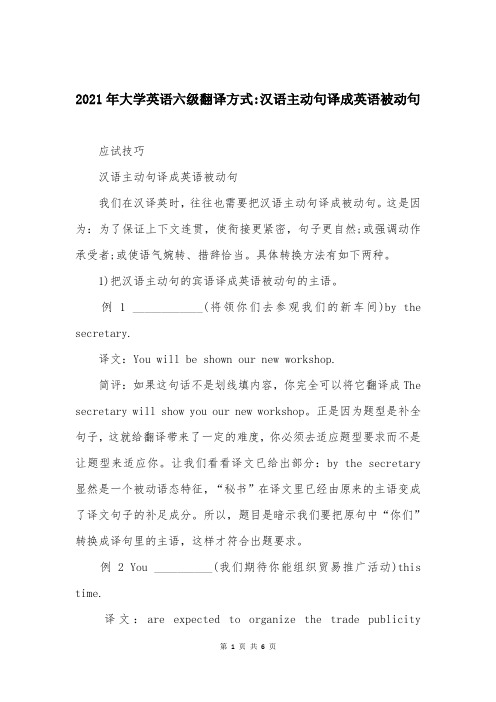
2021年大学英语六级翻译方式:汉语主动句译成英语被动句应试技巧汉语主动句译成英语被动句我们在汉译英时,往往也需要把汉语主动句译成被动句。
这是因为:为了保证上下文连贯,使衔接更紧密,句子更自然;或强调动作承受者;或使语气婉转、措辞恰当。
具体转换方法有如下两种。
1)把汉语主动句的宾语译成英语被动句的主语。
例 1 ____________(将领你们去参观我们的新车间)by the secretary.译文:You will be shown our new workshop.简评:如果这句话不是划线填内容,你完全可以将它翻译成The secretary will show you our new workshop。
正是因为题型是补全句子,这就给翻译带来了一定的难度,你必须去适应题型要求而不是让题型来适应你。
让我们看看译文已给出部分:by the secretary 显然是一个被动语态特征,“秘书”在译文里已经由原来的主语变成了译文句子的补足成分。
所以,题目是暗示我们要把原句中“你们”转换成译句里的主语,这样才符合出题要求。
例 2 You __________(我们期待你能组织贸易推广活动)this time.译文:are expected to organize the trade publicitycampaigns.简评:根据题目可推知全句意思是:我们期望你能组织这次的贸易推广活动。
中文句子主语、谓语、宾语分别是:我们、期望、你。
但是在英文译文的给出部分中我们看到句子以you开头,也就是说“你被期望能组织这次贸易推广活动”。
中文的宾语变成了英文的主语,这就要求我们在翻译时要使用被动语态。
全句完整答案是:You are expected to organize the trade publicity campaigns this time.2)当汉语句以“我们”、“人们”、“大家”等泛指性代词作主语时,在翻译成英文的时候常常可以忽略主语不译,并把英文译句处理成被动语态。
主动句与被动句的互换
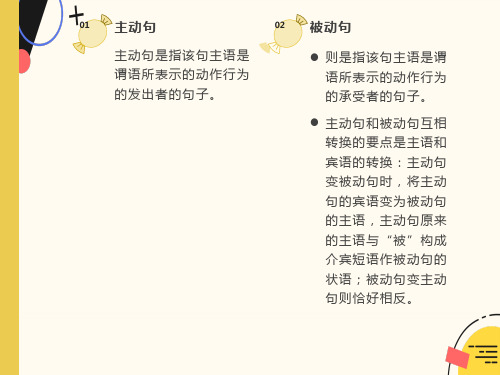
01
可见,现代汉语中多数“被”字句有不如意、不愉快的感情色彩;但,中性的或表示如意的、愉快的 “被”字句在现代汉语中也是存在的。如同“把”字句一样,“被”字句也不能由任何主动句变换而 成,也有自己的构成和应用条件:
如:突然觉得手被什么东西给划了一下。我的书被小王给拿走了。话要 让他给听见了,怎么办? 花瓶叫她给打碎了一个。 5. “被……把”格式。这种句式里的两个受事往往有领属、同一等关系。
如:那年修反帝渠,他被炸药把一条腿给炸掉了。(“他”和“一条腿” 都是受事,两者有领属关系)
他不在村里,叫人家广聚把他撵跑了。(“他”和“他”是同一对象的 关系)
常见的变式句有主谓倒置的,定语、状语与中心语倒置的。 有成分倒置的变式句又叫倒装句。
1.主谓倒置句。为了强调谓语或由于说话急促而先说谓语然 后补出主语。这种句式常见于疑问句、祈使句或感叹句中。两 部分之间都有停顿。例:
①蓬头,赤脚,一边扣着钮扣,几个还没有睡醒的“懒虫” 从楼上冲了下来。《包身工》
02
动词一般是有处置性的,跟“把”字句里的动词差不多。能进入“被”字句谓语部分的动词一般不能 是简单形式。动词后面多有补语或别的成分。如果只用一个双音动词,前面就要有能愿动词、时间词 语、否定副词等状语。例如: 他们没有被土匪收买。(前面有否定副词) 孩子们一定会被感动。 (前面有副词、能愿动词) 风浪中行船的人随时会被风浪吞噬。(前面有时间副词、能愿动词) 病 人被他们不负责任地往地上一丢。(前有状语) 他被老板看中了。(后有动态助词) 他被打伤了。 (后有补语和动态助词) 小王被骂了一顿。(后有动态助词和补语) 地里被种上了粮食。(后有 宾语) 孩子被老师喊走了一个。(后有补语、动态助词、宾语)
【考研英语】语法:主动句变被动句3步走
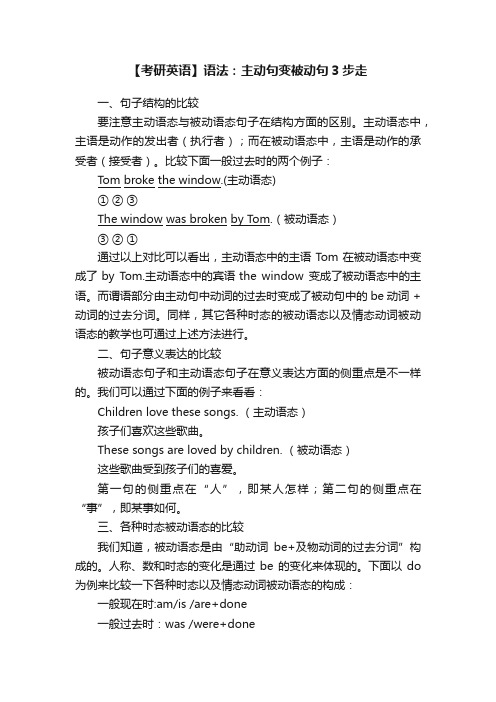
【考研英语】语法:主动句变被动句3步走一、句子结构的比较要注意主动语态与被动语态句子在结构方面的区别。
主动语态中,主语是动作的发出者(执行者);而在被动语态中,主语是动作的承受者(接受者)。
比较下面一般过去时的两个例子:Tom broke the window.(主动语态)① ② ③The window was broken by T om.(被动语态)③ ② ①通过以上对比可以看出,主动语态中的主语Tom在被动语态中变成了by Tom.主动语态中的宾语the window 变成了被动语态中的主语。
而谓语部分由主动句中动词的过去时变成了被动句中的be动词 +动词的过去分词。
同样,其它各种时态的被动语态以及情态动词被动语态的教学也可通过上述方法进行。
二、句子意义表达的比较被动语态句子和主动语态句子在意义表达方面的侧重点是不一样的。
我们可以通过下面的例子来看看:Children love these songs. (主动语态)孩子们喜欢这些歌曲。
These songs are loved by children. (被动语态)这些歌曲受到孩子们的喜爱。
第一句的侧重点在“人”,即某人怎样;第二句的侧重点在“事”,即某事如何。
三、各种时态被动语态的比较我们知道,被动语态是由“助动词be+及物动词的过去分词”构成的。
人称、数和时态的变化是通过be 的变化来体现的。
下面以do 为例来比较一下各种时态以及情态动词被动语态的构成:一般现在时:am/is /are+done一般过去时:was /were+done一般将来时:will/shall be+done现在进行时:am/is /are being+done 过去进行时:was/were being+done 现在完成时:have/has been +done 情态动词:情态动词 be + done。
句子语态变换演练
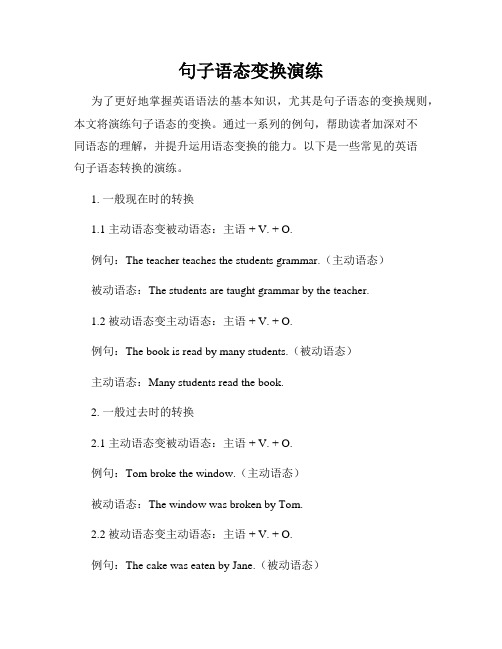
句子语态变换演练为了更好地掌握英语语法的基本知识,尤其是句子语态的变换规则,本文将演练句子语态的变换。
通过一系列的例句,帮助读者加深对不同语态的理解,并提升运用语态变换的能力。
以下是一些常见的英语句子语态转换的演练。
1. 一般现在时的转换1.1 主动语态变被动语态:主语 + V. + O.例句:The teacher teaches the students grammar.(主动语态)被动语态:The students are taught grammar by the teacher.1.2 被动语态变主动语态:主语 + V. + O.例句:The book is read by many students.(被动语态)主动语态:Many students read the book.2. 一般过去时的转换2.1 主动语态变被动语态:主语 + V. + O.例句:Tom broke the window.(主动语态)被动语态:The window was broken by Tom.2.2 被动语态变主动语态:主语 + V. + O.例句:The cake was eaten by Jane.(被动语态)主动语态:Jane ate the cake.3. 一般将来时的转换3.1 主动语态变被动语态:主语 + will + be + V. + O.例句:I will invite all my friends to the party.(主动语态)被动语态:All my friends will be invited to the party by me.3.2 被动语态变主动语态:主语 + will + V. + O.例句:The package will be delivered by the postman.(被动语态)主动语态:The postman will deliver the package.4. 现在进行时的转换4.1 主动语态变被动语态:主语 + am/is/are + being + V. + O.例句:She is preparing dinner in the kitchen.(主动语态)被动语态:Dinner is being prepared in the kitchen by her.4.2 被动语态变主动语态:主语 + am/is/are + V. + O.例句:The car is being repaired by the mechanic.(被动语态)主动语态:The mechanic is repairing the car.5. 过去进行时的转换5.1 主动语态变被动语态:主语 + was/were + being + V. + O.例句:He was painting the wall yesterday.(主动语态)被动语态:The wall was being painted by him yesterday.5.2 被动语态变主动语态:主语 + was/were + V. + O.例句:The cake was being baked by my mom.(被动语态)主动语态:My mom was baking the cake.以上是关于句子语态变换的演练,通过这些例句,相信大家对于句子语态的变换规则有了更深入的理解。
主动句变被动句之欧阳与创编
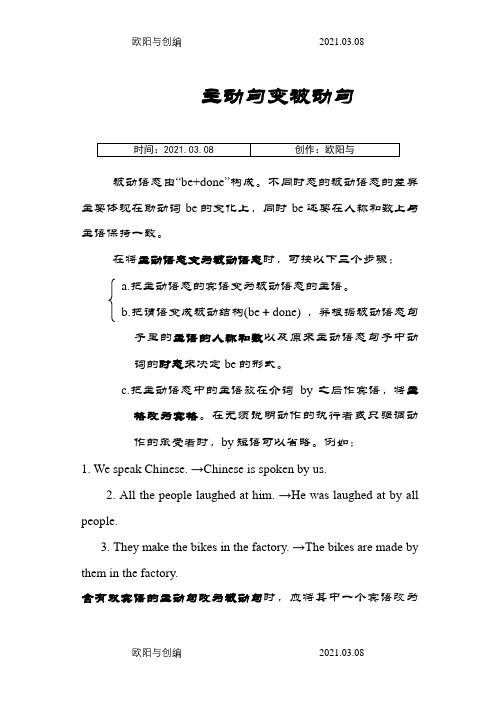
主动句变被动句被动语态由“be+done”构成。
不同时态的被动语态的差异主要体现在助动词be的变化上,同时be还要在人称和数上与主语保持一致。
在将主动语态变为被动语态时,可按以下三个步骤:a.把主动语态的宾语变为被动语态的主语。
b.把谓语变成被动结构(be+done) ,并根据被动语态句子里的主语的人称和数以及原来主动语态句子中动词的时态来决定be的形式。
c.把主动语态中的主语放在介词by之后作宾语,将主格改为宾格。
在无须说明动作的执行者或只强调动作的承受者时,by短语可以省略。
例如:1. We speak Chinese. →Chinese is spoken by us.2. All the people laughed at him. →He was laughed at by all people.3. They make the bikes in the factory. →The bikes are made by them in the factory.含有双宾语的主动句改为被动句时,应将其中一个宾语改为被动结构的主语,另一个宾语仍保留在原处。
一种情况是把间接宾语(指人)变为主语,直接宾语(指物)不变;另一种情况是把直接宾语(指物)变为主语,间接宾语(指人)不变,这时,间接宾语前通常加介词to,有时加for。
例如:My father gave me a new book on my birthday.→I was given a new book (by my father) on my birthday. (间接宾语作了主语)→A new book was given to me (by my father) on m y birthday. (直接宾语作了主语)常跟双宾语的动词有:give sb. sth. / give sth. to sb. show sb. sth. / show sth. to sb.send sb. sth. / send sth. to sb. bring sb. sth. / bring sth. to sb.pass sb. sth. / pass sth. to sb. lend sb. sth. / lend sth. to sb.buy sb. sth. / buy sth. for sb. make sb. sth. / make sth. for sb.get sb. sth. / get sth. for sb. sing sb. sth. / sing sth. for sb.含有情态动词的主动句变成被动句时,由“情态动词+be+done”构成,例如:We can repair this watch in two days.→This watch can be repaired in two days.They should do it at once.→It should be done at once.含有感官动词的主动句变被动句时,原来不带to的感官动词变成被动语态后,to仍要还原,例如: He saw a girl play in the next room. →The girl is seen to play by him in the next room.We hear our teacher sing in the office. →Our teacher is heard to sing in the office.练习: 将下列句子变为被动语态:1. We often sing this song._____________________________________________________ ________2. He broke his leg in the match._____________________________________________________ _________3. She will sell her house soon._____________________________________________________ _________4. He is repairing the machine._____________________________________________________ _________5. He has finished his work._____________________________________________________ _________6. We call him Lao Wang._____________________________________________________ ________7. We must do something to help her._____________________________________________________ ________8. What did you say at the meeting?_____________________________________________________ ________9. He gave me some old magazines._____________________________________________________ _________10. He told me to wait at the gate.__________________________________________________ ____________。
主动句变被动句特殊情况
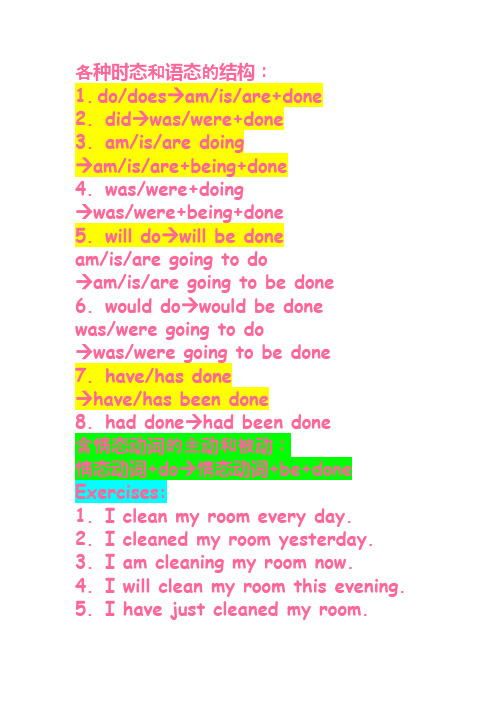
各种时态和语态的结构:1.do/does→am/is/are+done2.did→was/were+done3.am/is/are doing→am/is/are+being+done4.was/were+doing→was/were+being+done5.will do→will be doneam/is/are going to do→am/is/are going to be done6.would do→would be donewas/were going to do→was/were going to be done7.have/has done→have/has been done8.had done→had been done含情态动词的主动和被动:情态动词+do→情态动词+be+done Exercises:1.I clean my room every day.2.I cleaned my room yesterday.3.I am cleaning my room now.4.I will clean my room this evening.5.I have just cleaned my room.6.You can clean your room tomorrow. More exercises:1. People use knives for cutting things2. They filled the box with books.3. They make the bikes in the factory.4. People speak English in many countries.5. They will paint the house again next year.6. I have told the children many times not to play with fire.7. The workers are repairing the bridge.8. You must finish the article before Friday.9. He is teaching us how to operate the new machine.10. They have repaired the bridge.11. My father wrote the book12. We must do something to help her.13. Our village has built a plastic factory.14. We call him Jim.15. We must take good care of the young trees.16. My mother made me a cake.17. We saw him enter the classroom.18. I saw them playing football.19. I made him join the English Corner.20. I often hear her sing in the next room.将主动语态变被动语态应注意几个特殊情况:一、含双宾语的主动结构变为被动结构时,有两种方法:①将间接宾语变为主语,直接宾语保持不变;②将直接宾语变为主语,间接宾语用介词to或for引导。
中小学英语语法基础——主动语态转化成被动语态
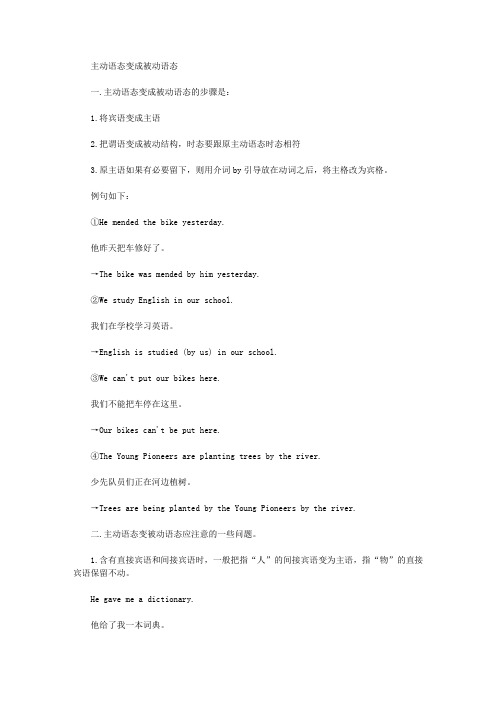
主动语态变成被动语态一.主动语态变成被动语态的步骤是:1.将宾语变成主语2.把谓语变成被动结构,时态要跟原主动语态时态相符3.原主语如果有必要留下,则用介词by引导放在动词之后,将主格改为宾格。
例句如下:①He mended the bike yesterday.他昨天把车修好了。
→The bike was mended by him yesterday.②We study English in our school.我们在学校学习英语。
→English is studied (by us) in our school.③We can't put our bikes here.我们不能把车停在这里。
→Our bikes can't be put here.④The Young Pioneers are planting trees by the river.少先队员们正在河边植树。
→Trees are being planted by the Young Pioneers by the river.二.主动语态变被动语态应注意的一些问题。
1.含有直接宾语和间接宾语时,一般把指“人”的间接宾语变为主语,指“物”的直接宾语保留不动。
He gave me a dictionary.他给了我一本词典。
→I was given a dictionary by him.如果要将直接宾语(物)变为主语,那么动词后要用介词,这个介词是由与其搭配的动词决定的。
①Mother bought us a big present.妈妈给我们买了一份大礼物。
→A big present was bought for us by mother.②He showed me the ticket.他向我出示了这张票。
→The ticket was showed to me by him.常见的能接双宾语(直接宾语和间接宾语)的词有:give, show, bring, lend, send等,这些词与介词to搭配;还有buy, make, draw等,这些词与介词for搭配。
句子的主被动转换
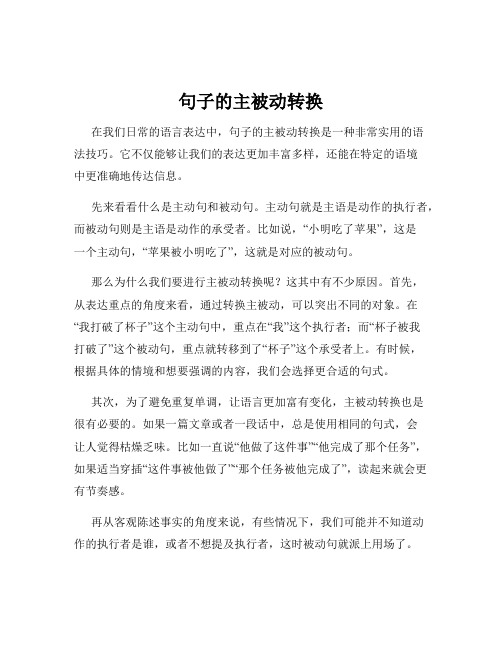
句子的主被动转换在我们日常的语言表达中,句子的主被动转换是一种非常实用的语法技巧。
它不仅能够让我们的表达更加丰富多样,还能在特定的语境中更准确地传达信息。
先来看看什么是主动句和被动句。
主动句就是主语是动作的执行者,而被动句则是主语是动作的承受者。
比如说,“小明吃了苹果”,这是一个主动句,“苹果被小明吃了”,这就是对应的被动句。
那么为什么我们要进行主被动转换呢?这其中有不少原因。
首先,从表达重点的角度来看,通过转换主被动,可以突出不同的对象。
在“我打破了杯子”这个主动句中,重点在“我”这个执行者;而“杯子被我打破了”这个被动句,重点就转移到了“杯子”这个承受者上。
有时候,根据具体的情境和想要强调的内容,我们会选择更合适的句式。
其次,为了避免重复单调,让语言更加富有变化,主被动转换也是很有必要的。
如果一篇文章或者一段话中,总是使用相同的句式,会让人觉得枯燥乏味。
比如一直说“他做了这件事”“他完成了那个任务”,如果适当穿插“这件事被他做了”“那个任务被他完成了”,读起来就会更有节奏感。
再从客观陈述事实的角度来说,有些情况下,我们可能并不知道动作的执行者是谁,或者不想提及执行者,这时被动句就派上用场了。
比如“窗户被打破了”,我们可能暂时不清楚是谁打破的窗户,或者出于某种原因不想点明。
接下来,我们具体讲讲如何进行主被动转换。
一般来说,主动句变被动句,需要把主动句中的宾语变成被动句的主语,然后在原来主语的前面加上“被”字,谓语动词变成相应的被动形式。
例如,“老师批评了学生”,要变成被动句,就把“学生”变成主语,“老师”前加“被”,即“学生被老师批评了”。
不过,这里要注意,不是所有的主动句都能随意转换成被动句。
比如,“他跑得快”,这是一种表示状态或能力的句子,就没法变成被动句。
还有一些特殊的情况。
当主动句中有双宾语的时候,转换时要注意。
比如“他给了我一本书”,可以转换成“我被他给了一本书”或者“一本书被他给了我”。
- 1、下载文档前请自行甄别文档内容的完整性,平台不提供额外的编辑、内容补充、找答案等附加服务。
- 2、"仅部分预览"的文档,不可在线预览部分如存在完整性等问题,可反馈申请退款(可完整预览的文档不适用该条件!)。
- 3、如文档侵犯您的权益,请联系客服反馈,我们会尽快为您处理(人工客服工作时间:9:00-18:30)。
主动句变被动句
欧阳光明(2021.03.07)
被动语态由“be+done”构成。
不同时态的被动语态的差异主要体现在助动词be的变化上,同时be还要在人称和数上与主语保持一致。
在将主动语态变为被动语态时,可按以下三个步骤:
a.把主动语态的宾语变为被动语态的主语。
b.把谓语变成被动结构(be+done) ,并根据被动语态句子里的主语的
人称和数以及原来主动语态句子中动词的时态来决定be的形式。
c.把主动语态中的主语放在介词by之后作宾语,将主格改为宾格。
在无须说明动作的执行者或只强调动作的承受者时,by短语可以
省略。
例如:
1. We speak Chinese. →Chinese is spoken by us.
2. All the people laughed at him. →He was laughed at by all people.
3. They make the bikes in the factory. →The bikes are made by them in the factory.
含有双宾语的主动句改为被动句时,应将其中一个宾语改为被动结构的主语,另一个宾语仍保留在原处。
一种情况是把间接宾语(指人)变为主语,直接宾语(指物)不变;另一种情况是把直接宾语(指物)变为主语,间接宾语(指人)不变,这时,间接宾语前通常加介词to,有时加for。
例如:
My father gave me a new book on my birthday.
→I was given a new book (by my father) on my birthday. (间接宾语作了主
语)
→A new book was given to me (by my father) on my birt hday. (直接宾语作了主语)
常跟双宾语的动词有:give sb. sth. / give sth. to sb. show sb. sth. / show sth. to sb.
send sb. sth. / send sth. to sb. bring sb. sth. / bring sth. to sb.
pass sb. sth. / pass sth. to sb. lend sb. sth. / lend sth. to sb.
buy sb. sth. / buy sth. for sb. make sb. sth. / make sth. for sb.
get sb. sth. / get sth. for sb. sing sb. sth. / sing sth. for sb.
含有情态动词的主动句变成被动句时,由“情态动词+be+done”构成,例如:
We can repair this watch in two days.→This watch can be repaired in two days.
They shoul d do it at once.→It should be done at once.
含有感官动词的主动句变被动句时,原来不带to的感官动词变成被动语态后,to仍要还原,例如: He saw a girl play in the next room. →The girl is seen to play by him in the next room.
We hear our teacher sing in the office. → Our teacher is heard to sing in the office.
练习: 将下列句子变为被动语态:
1. We often sing this song.
_____________________________________________________________
2. He broke his leg in the match.
______________________________________________________________ 3. She will sell her house soon.
______________________________________________________________ 4. He is repairing the machine.
______________________________________________________________ 5. He has finished his work.
______________________________________________________________ 6. We call him Lao Wang.
_____________________________________________________________ 7. We must do something to help her.
_____________________________________________________________ 8. What did you say at the meeting?
_____________________________________________________________ 9. He gave me some old magazines.
______________________________________________________________ 10. He told me to wait at the gate.
______________________________________________________________。
